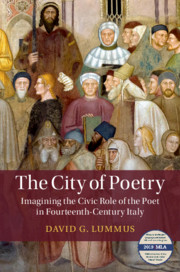Book contents
- The City of Poetry
- Cambridge Studies in Medieval Literature
- The City of Poetry
- Copyright page
- Epigraph
- Contents
- Acknowledgments
- Note on Translations
- Introduction
- Chapter 1 Albertino Mussato, Poet of the City
- Chapter 2 Dante Alighieri, Poet without a City
- Chapter 3 Francesco Petrarch, Poet beyond the City
- Chapter 4 Giovanni Boccaccio, Poet for the City
- Epilogue
- Bibliography
- Index
- Cambridge Studies in Medieval Literature
Chapter 4 - Giovanni Boccaccio, Poet for the City
Published online by Cambridge University Press: 03 December 2020
- The City of Poetry
- Cambridge Studies in Medieval Literature
- The City of Poetry
- Copyright page
- Epigraph
- Contents
- Acknowledgments
- Note on Translations
- Introduction
- Chapter 1 Albertino Mussato, Poet of the City
- Chapter 2 Dante Alighieri, Poet without a City
- Chapter 3 Francesco Petrarch, Poet beyond the City
- Chapter 4 Giovanni Boccaccio, Poet for the City
- Epilogue
- Bibliography
- Index
- Cambridge Studies in Medieval Literature
Summary
The fourth chapter shows how Boccaccio manipulates the Petrarchan model of the poet for different ends. It is prefaced by a reassessment of the relationship between Boccaccio and Petrarch, focusing on the political differences between the two poets. In an analysis of the initial years of their friendship, the chapter shows how Boccaccio moves from seeing Petrarch’s presence in Florence as the condition for the repatriation of Dante’s poem, to trying to separate the two poets from one another in his first redaction of the Vita di Dante. After establishing the fundamental political and cultural differences between the two poets, the chapter moves to an analysis of Boccaccio’s defense of poetry in Book 14 of the Genealogie Deorum Gentilium Libri, which has traditionally been understood as a reiteration of Petrarch’s ideas. It argues that Boccaccio undermines and at times reverses the terms of Petrarch’s notion of the poet’s relationship to the city, which also has implications for the value of vernacular poetry. Throughout, the chapter indicates how Boccaccio’s Decameron and vernacular poetry are often in the background of his defense. It concludes with the suggestion that Boccaccio obliquely claims for himself the role of the poet for the city.
Keywords
- Type
- Chapter
- Information
- The City of PoetryImagining the Civic Role of the Poet in Fourteenth-Century Italy, pp. 156 - 216Publisher: Cambridge University PressPrint publication year: 2020



